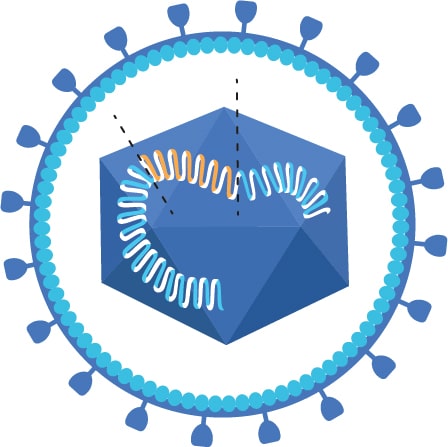Krystal’s Engineered Replication Deficient HSV-1 Platform
Krystal’s engineered replication deficient HSV-1–based platform enables the development of redosable gene therapies that can be administered non- or minimally‑invasively.
The platform is based on a differentiated viral vector system that leverages many of HSV-1’s natural properties, including episomal delivery, a high payload capacity, broad tropism, and inherent evasion of the immune system, while being engineered to be replication incompetent to reduce cytotoxicity.

Unique Properties of HSV-1
Large genetic payload capacity well in excess of other viral vectors
HSV-1 is a relatively complex virus with a large genome. The theoretical cargo capacity > 30 kb significantly exceeds the capacity of AAV (<5 kb) and lentiviruses (9 kb); VYJUVEK contains over 19 kb of genetic cargo.
Efficient transduction of wide range of cell types
HSV-1 employs multiple mechanisms to gain cell entry and majority of cell types are permissive; Krystal vectors shown to transduce keratinocytes, fibroblasts, and various cells of the eye and lung so far.
Evades host immunity allowing for repeat dosing and reducing immunotoxicity
The ability of HSV-1 to block innate and adaptive immune responses is retained in Krystal vectors; no evidence of significant or persistent neutralizing immunity after single or repeat dosing in preclinical or clinical studies to date.
DNA payload enables durable expression without integration risk
HSV-1 delivers its genome to the nucleus where it persists episomally; no clinical reports of integrations with parental wild‑type virus or Krystal constructs.
Scalable manufacturing of viral gene therapies
Capable of increasing manufacturing in a streamlined manner because of in-house capabilities.
Mechanism of Action
Discovering, developing, and commercializing genetic medicines with purpose


 United States
United States Germany
Germany France
France